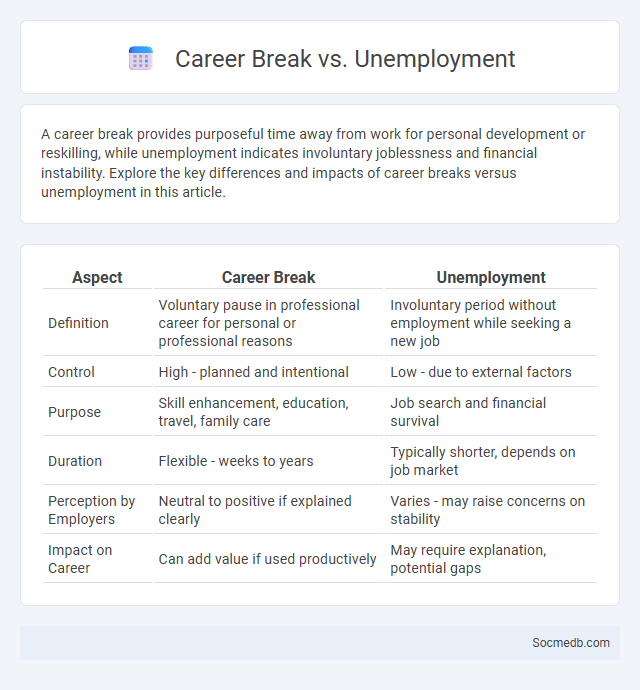
Photo illustration: Career break vs Unemployment
A career break provides purposeful time away from work for personal development or reskilling, while unemployment indicates involuntary joblessness and financial instability. Explore the key differences and impacts of career breaks versus unemployment in this article.
Table of Comparison
| Aspect | Career Break | Unemployment |
|---|---|---|
| Definition | Voluntary pause in professional career for personal or professional reasons | Involuntary period without employment while seeking a new job |
| Control | High - planned and intentional | Low - due to external factors |
| Purpose | Skill enhancement, education, travel, family care | Job search and financial survival |
| Duration | Flexible - weeks to years | Typically shorter, depends on job market |
| Perception by Employers | Neutral to positive if explained clearly | Varies - may raise concerns on stability |
| Impact on Career | Can add value if used productively | May require explanation, potential gaps |
Understanding Career Breaks: Definition and Purpose
Career breaks refer to intentional interruptions in professional employment, often taken for personal growth, skill development, or life events such as travel, education, or caregiving. Understanding the purpose of these breaks helps you frame them positively on your social media profiles, showcasing adaptability and continuous learning. Highlighting career breaks effectively can enhance your personal brand and attract potential employers or networking opportunities.
Unemployment Explained: Causes and Impact
Unemployment arises from various causes, including economic downturns, technological advances reducing job availability, and mismatches between workers' skills and market demands. Its impact extends beyond lost income, leading to increased social stress, diminished mental health, and reduced economic growth. Understanding these factors helps you navigate challenges and adapt to evolving labor market conditions effectively.
Key Differences Between Career Breaks and Unemployment
Career breaks often involve voluntary pauses taken for personal growth, education, or travel, whereas unemployment typically results from involuntary job loss. Career breaks may enhance long-term skills and networking opportunities visible on LinkedIn profiles, while unemployment can pose challenges in maintaining professional momentum. Understanding these distinctions aids in tailoring social media narratives for recruiters and professional connections.
Motivations Behind Taking a Career Break
People take career breaks for various social media-driven motivations including the desire to escape digital burnout or to build a personal brand that requires time away from traditional work. You might also seek a break to upskill through online courses or to engage in content creation that aligns with your passions and professional goals. Understanding these motivations helps to harness social media as a tool for career growth rather than just a distraction.
Navigating the Stigma: Career Break vs. Unemployment
Navigating the stigma surrounding career breaks versus unemployment requires a strategic approach to showcasing your skills and growth during these periods. You can emphasize transferable skills, personal development, and proactive initiatives to reshape potential employers' perceptions. Highlighting completed projects, volunteer work, or education during your career break demonstrates commitment and adaptability in your professional journey.
Financial Considerations: Career Break vs. Unemployment
Taking a career break can impact your financial stability differently compared to unemployment, as you may have planned savings or severance packages in place, whereas unemployment often leads to immediate loss of steady income. Social media platforms can influence your financial planning by providing access to communities, job search tools, and freelance opportunities that help mitigate income gaps during these periods. Managing your online presence strategically enhances your chances of securing new employment or freelance work, directly affecting your financial resilience.
Addressing Career Gaps on Your Resume
Highlighting volunteer work, freelance projects, or relevant online courses on social media platforms can effectively address career gaps on your resume. Sharing portfolio pieces, certifications, and professional achievements on LinkedIn or personal websites demonstrates continuous skill development. Consistent updates and networking on industry-specific social media groups signal ongoing engagement and commitment to career growth.
Psychological Effects: Career Break and Unemployment Compared
Social media impacts psychological well-being differently during career breaks and unemployment, with unemployed individuals often experiencing heightened anxiety and social isolation due to negative comparisons and stigma on platforms like Facebook and Instagram. Career breaks can trigger mixed emotions, as social media may foster both support through professional networks like LinkedIn and pressure from idealized success stories. Studies reveal increased depressive symptoms linked to prolonged social media exposure during unemployment, emphasizing the role of digital interactions in mental health outcomes.
Re-entering the Workforce After a Career Break or Unemployment
Leveraging social media platforms like LinkedIn and Twitter enhances visibility when re-entering the workforce after a career break or unemployment. Optimizing profiles with relevant keywords, showcasing updated skills, and engaging with industry-specific groups amplify networking opportunities and attract recruiters. Consistent activity on social media builds professional credibility and facilitates reconnecting with potential employers and colleagues.
Making the Right Choice: Is a Career Break or Navigating Unemployment Better for You?
Evaluating whether a career break or navigating unemployment suits your goals involves considering the impact on your professional growth and mental health. Social media platforms offer powerful tools for networking, skill-building, and personal branding that can enhance your employability during either phase. By strategically leveraging these digital channels, you can position yourself effectively, ensuring your career trajectory remains aligned with your ambitions.
 socmedb.com
socmedb.com